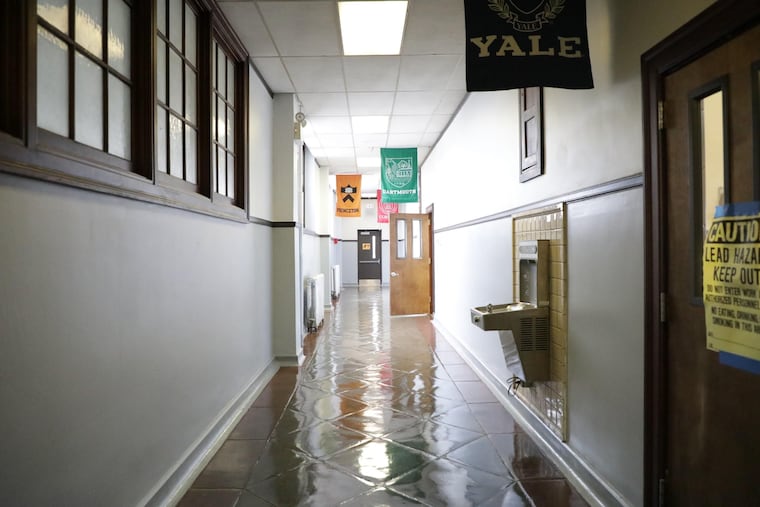Parents fuming after their kindergartners are booted from South Philly elementary to make room for kids from wealthier school
Parents of incoming kindergartners at Nebinger Elementary charge that their kids are being booted from the school because nearby Meredith Elementary has more kindergartners than it has room for. Under the rules, Meredith students automatically earn a place at Nebinger, the next closest school.

Some South Philadelphia schools are bursting at the seams, increasingly filled with middle-class families choosing to stay in Philadelphia and invest in its public school system.
But a Philadelphia School District move to give away kindergarten seats at George W. Nebinger School, a diverse and largely low-income elementary school, to overflow children from its neighboring William M. Meredith School, a whiter and wealthier elementary school, has sparked controversy since the affected families received notice this week.
“That the district is making Meredith’s more affluent and privileged families entitled to seats that should belong to Nebinger’s students is a disgrace to the system and harmful to the character of our community,” the Nebinger PTA wrote in an open letter to the school community.
Just 25 percent of Meredith students live in poverty; 65 percent are white. Nebinger looks more like the district as a whole: 98 percent of students live in poverty, and most are children of color. Only 23 percent are white.
The situation, which could be repeated in schools across the city, speaks to the immediate need for a citywide school facilities planning process, which has never been completed. The School District recently announced one that will start in the fall, but both Meredith and Nebinger families say that any solutions it proposes will come too late.
Seats at Meredith, at Fifth and Fitzwater Streets, have long been at a premium. For years, students who lived outside the school’s attendance zone, or catchment, were sometimes admitted if they received permission from the principal. The district stopped that policy three years ago, citing concerns about equity and dwindling space at the school.
A lottery system was instituted for kindergarten seats, with those children who did not win seats at Meredith sent to Nebinger, the closest school, just a few blocks away at Sixth and Carpenter Streets.
Though the overflow policy has been in place for three years, this is the first year it has bumped students who believed they had spots at Nebinger.
Meredith currently has 37 more kindergartners in its catchment than it has room for; those students automatically earn a place at Nebinger. Twenty-four would-be Nebinger kindergartners are being turned away because they live outside the school’s attendance zone. Sixteen of the 24 have a sibling enrolled at Nebinger, where more than half of the school’s student body comes from outside its catchment.
That’s why Ian Thomas got a letter this week explaining that his rising kindergartner would no longer be given a seat at the school. Thomas and his wife live outside Nebinger’s catchment, but their now-second grader was given a spot at Nebinger through the district’s school selection process. When it came time to think about where to send their younger child to kindergarten, they knew they wanted Nebinger — Thomas is on the school’s advisory council, and his wife is active in Friends of Nebinger, the nonprofit associated with the school. They received assurances from the school’s principal that their son was in.
Now, they’re hearing he doesn’t have a spot. The Thomases and other families are furious. They say they’ll fight all summer to keep their children together and to keep intact a school that has cultivated diversity and a sense of community, and that the district should not put the entire burden of Meredith’s overcrowding on one school.
“I understand that there’s overcrowding at Meredith. That’s legitimate — there’s too many people in that neighborhood, it’s overgentrified. I guess our problems are just lower on the School District’s decision tree,” said Thomas, who like a number of families is frustrated at what he believes is a series of district missteps and inconsistent application of policies.
Some families who got the notifications that their children no longer had Nebinger spots are white and middle class, like Thomas. But the list of families turned away is a diverse one racially and economically, like the school.
Li Jun Yang, another parent in the same predicament, said her daughter, Xin Yi, had already met her Nebinger teacher, and was looking forward to attending the same school as her sisters.
“How am I to explain the news to my daughters? Is the district really going to break our family apart with Nebinger?” Yang said.
Karyn Lynch ,the district’s chief of student support services, said that the district was sticking to admissions policies that were designed to “monitor enrollment, monitor capacity, monitor equity.”
Lynch said that no out-of-catchment Nebinger children should have been given kindergarten seats for the fall, and that the in-catchment Meredith students took priority over the out-of-catchment Nebinger children.
“This doesn’t mean that we treat some better than others,” Lynch said.
She said the situation is fluid, and if more spots open up, the district will seek to find places at Nebinger in September for children whose siblings are enrolled at the school. But there are no guarantees.
“It’s a great story that these schools have become so popular,” Lynch said. “But clearly, there’s also a downside.”